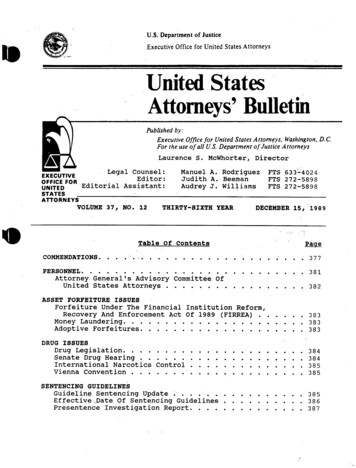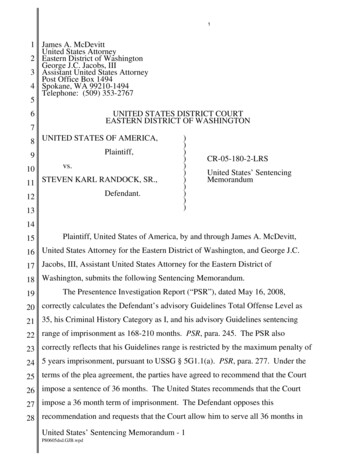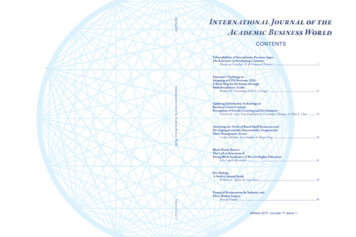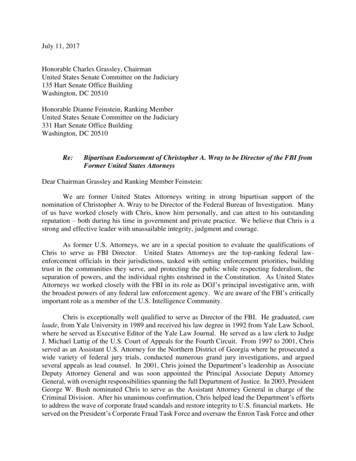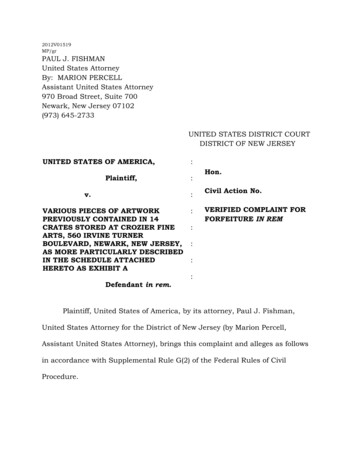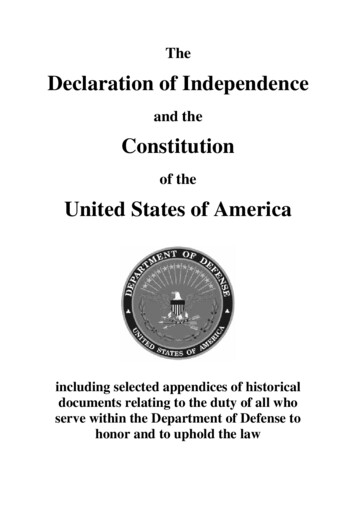
Transcription
TheDeclaration of Independenceand theConstitutionof theUnited States of Americaincluding selected appendices of historicaldocuments relating to the duty of all whoserve within the Department of Defense tohonor and to uphold the law
TABLE OF CONTENTSINTRODUCTIONiTHE DECLARATION OFINDEPENDENCE; 17761THE CONSTITUTION OF THEUNITED STATES OF AMERICA;178711Article. I.11Article. II.21Article III.24Article. IV.26Article. V.27Article. VI.28Article. VII.29
THE PREAMBLE TO THE BILLOF RIGHTS; 178933THE FIRST 10 AMENDMENTSTO THE CONSTITUTION; 179135Amendment I35Amendment II35Amendment III35Amendment IV36Amendment V36Amendment VI36Amendment VII37Amendment VIII37Amendment IX37Amendment X37
AMENDMENTS XI-XXVII TOTHE CONSTITUTION; 1795-199238Amendment XI38Amendment XII38Amendment XIII40Amendment XIV40Amendment XV42Amendment XVI43Amendment XVII43Amendment XVIII44Amendment XIX45Amendment XX45Amendment XXI47Amendment XXII48Amendment XXIII49Amendment XXIV49Amendment XXV50Amendment XXVI52Amendment XXVII52
APPENDIX A: Rules for theRegulation of the Navy. . . ; 1775 53APPENDIX B: Articles of War;177554INSPECTOR GENERALREFERENCE GUIDE56
INTRODUCTIONTwo centuries and two years before the 106th Congressestablished "Liberty Day" as an annual "celebration of theDeclaration of Independence and the United States Constitution,where our unalienable rights and liberties are enumerated,"President John Adams admonished American military officers that"Oaths in this country are as yet universally considered as sacredobligations." For all of us who have sworn to support and defendthis Constitution, therefore, it behooves us to familiarize ourselveswith its text and historical context.It might appear to some that Congress requiring every“individual elected or appointed to an office of honor or profit inthe civil service or uniformed services” to take an oath of officeconcluding with “So help me God” (5 U.S.C. § 3331) wouldviolate the First Amendment’s prohibition against “anestablishment of religion.” To the contrary, oaths have alwaysbeen an essential element of our constitutional system. In his 1796Farewell Address, President George Washington described thefundamentally religious nature of oaths: “Of all the dispositionsand habits which lead to national prosperity, Religion and moralityare indispensable supports. . . . [W]here is the security forproperty, for reputation, for life, if the sense of religious obligationdesert the Oaths, which are the instruments of investigation inCourts of Justice?”The Constitution itself requires that "a regular Statement andAccount of the Receipts and Expenditure of all public Money shallbe published from time to time." Moreover, as explained in the1789 Preamble to the Bill of Rights (reproduced in this booklet),the first ten Amendments were designed “to preventmisconstructions or abuse of its power,” i.e., to prevent abuses of“powers . . . delegated to the United States by the Constitution.”U.S. Const., amend X.i
The financial accountability of federal officers and theprevention of fraud, waste, and abuse of authority by those officersare thus core constitutional functions. When the Secretary ofDefense “declared war” on bureaucratic waste within the Pentagon– the day before the September 11, 2001, terrorist attacks – heanchored his remarks in a constitutionally-based notion ofaccountability: “Every dollar squandered on waste is one denied tothe warfighter. . . . Every dollar we spend was entrusted to us by ataxpayer who earned it . . . .”According to 1998 congressional testimony by retiredAdmiral Thomas H. Moorer, former Chief of Naval Operations andChairman of the Joint Chiefs of Staff, "Responsibility withoutaccountability 'according to law' undermines the core foundation ofthe Constitution, the principle known as the Rule of Law (asopposed to the rule of men), without which our Constitution is nomore than a piece of paper."All those who serve within this Department can be proud ofour military's historical commitment to the principles underlyingour Constitution, which require above all a firm commitment topersonal integrity and leadership. Former Assistant Secretary ofthe Navy and then President Theodore Roosevelt reminded us ofthe profound role of personal integrity and leadership in theAmerican republic:The stream will not permanently rise higherthan the main source; and the main source of nationalpower and national greatness is found in the averagecitizenship of the nation. Therefore it behooves us todo our best to see that the standard of the averagecitizen is kept high; and the average cannot be kepthigh unless the standard of the leaders is very muchhigher.The first Article of the 1775 "Rules for the Regulation of theNavy of the United Colonies of North-America" (Appendix A),mandated exemplary conduct by Naval leaders:ii
The Commanders of all ships and vesselsbelonging to the THIRTEEN UNITED COLONIES,are strictly required to shew in themselves a goodexample of honor and virtue to their officers and men,and to be very vigilant in inspecting the behaviour ofall such as are under them, and to discountenance andsuppress all dissolute, immoral and disorderlypractices; . . . .Likewise, the current statutory mandate that officers of allservices comport to a higher standard of personal behavior -- bothon and off duty (10 U.S.C. § 933) -- traces to the 1775 "AmericanArticles of War" (Appendix B). Article XLVII of the 1775 Articlesof War forbade officers from "behaving in a scandalous, infamousmanner." A November 1775 Amendment required not only that anofficer found guilty of fraud "be ipso facto cashiered, and deemedunfit for further service as an officer," but also that "it be added inthe punishment, that the crime, name, place of abode, andpunishment of the delinquent be published in the news papers, inand about the camp, and of that colony from which the offendercame, or usually resides: after which it shall be deemed scandalousin any officer to associate with him."These 1775 first principles were recodified by Congress in1956, almost verbatim, into federal statutory law for the Navy andMarine Corps: "All commanding officers and others in authority inthe naval service are required to show in themselves a goodexample of virtue, honor, patriotism, and subordination; to bevigilant inspecting the conduct of all persons who are placed undertheir command; to guard against and suppress all dissolute andimmoral practices, and to correct, according to the laws andregulations of the Navy, all persons who are guilty of them; . . . ."10 U.S.C. § 5947. In 1997, when Congress adapted and legislatedthese same first principles for the Army and the Air Force (10U.S.C. §§ 3583 & 8583), the accompanying Senate Report "note[d]that these standards have applied to Naval and Marine Corpsofficers since they were first drafted by John Adams and approvediii
by the Continental Congress in 1775." The Senate Armed ServicesCommittee explained the purpose of the 1997 legislation:This provision will not prevent an officer fromshunning responsibility or accountability for an actionor event. It does, however, establish a very clearstandard by which Congress and the nation canmeasure officers of our military services. Thecommittee holds military officers to a higher standardthan other members of society. The nation entrusts itsgreatest resource, our young men and women, to ourmilitary officers. In return, the nation deservescomplete integrity, moral courage, and the highestmoral and ethical conduct.All who serve within this Department should familiarizethemselves with the Declaration of Independence and theConstitution, as well as with the historical documents reproducedin the appendices.**The Secretary of Defense would like to express his gratitude to the Historian of theNavy, Dr. William S. Dudley, and to his staff, for proofreading and verifying thehistorical accuracy of documents reproduced in this compilation.iv
THE DECLARATION OFINDEPENDENCE; 1776A TranscriptionIN CONGRESS, July 4, 1776.The unanimous Declaration of the thirteenunited States of America,When in the Course of humanevents, it becomes necessary for onepeople to dissolve the politicalbands which have connected themwith another, and to assume amongthe powers of the earth, the separateand equal station to which the Lawsof Nature and of Nature's Godentitle them, a decent respect to theopinions of mankind requires thatthey should declare the causeswhich impel them to the separation.We hold these truths to be selfevident, that all men are created1
equal, that they are endowed bytheir Creator with certainunalienable Rights, that amongthese are Life, Liberty and thepursuit of Happiness.--That tosecure these rights, Governmentsare instituted among Men, derivingtheir just powers from the consentof the governed, --That wheneverany Form of Government becomesdestructive of these ends, it is theRight of the People to alter or toabolish it, and to institute newGovernment, laying its foundationon such principles and organizingits powers in such form, as to themshall seem most likely to effect theirSafety and Happiness. Prudence,indeed, will dictate thatGovernments long established2
should not be changed for light andtransient causes; and accordingly allexperience hath shewn, thatmankind are more disposed tosuffer, while evils are sufferable,than to right themselves byabolishing the forms to which theyare accustomed. But when a longtrain of abuses and usurpations,pursuing invariably the same Objectevinces a design to reduce themunder absolute Despotism, it is theirright, it is their duty, to throw offsuch Government, and to providenew Guards for their futuresecurity.--Such has been the patientsufferance of these Colonies; andsuch is now the necessity whichconstrains them to alter their formerSystems of Government. The3
history of the present King of GreatBritain is a history of repeatedinjuries and usurpations, all havingin direct object the establishment ofan absolute Tyranny over theseStates. To prove this, let Facts besubmitted to a candid world.He has refused his Assent toLaws, the most wholesomeand necessary for the publicgood.He has forbidden hisGovernors to pass Laws ofimmediate and pressingimportance, unlesssuspended in their operationtill his Assent should beobtained; and when so4
suspended, he has utterlyneglected to attend to them.He has refused to pass otherLaws for the accommodationof large districts of people,unless those people wouldrelinquish the right ofRepresentation in theLegislature, a rightinestimable to them andformidable to tyrants only.He has called togetherlegislative bodies at placesunusual, uncomfortable, anddistant from the depositoryof their public Records, forthe sole purpose of fatiguingthem into compliance withhis measures.5
He has dissolvedRepresentative Housesrepeatedly, for opposingwith manly firmness hisinvasions on the rights of thepeople.He has refused for a longtime, after such dissolutions,to cause others to be elected;whereby the Legislativepowers, incapable ofAnnihilation, have returnedto the People at large fortheir exercise; the Stateremaining in the mean timeexposed to all the dangers ofinvasion from without, andconvulsions within.6
He has endeavoured toprevent the population ofthese States; for that purposeobstructing the Laws forNaturalization of Foreigners;refusing to pass others toencourage their migrationshither, and raising theconditions of newAppropriations of Lands.He has obstructed theAdministration of Justice, byrefusing his Assent to Lawsfor establishing Judiciarypowers.He has made Judgesdependent on his Will alone,for the tenure of their7
offices, and the amount andpayment of their salaries.He has erected a multitudeof New Offices, and senthither swarms of Officers toharrass our people, and eatout their substance.He has kept among us, intimes of peace, StandingArmies without the Consentof our legislatures.He has affected to render theMilitary independent of andsuperior to the Civil power.He has combined with othersto subject us to a jurisdictionforeign to our constitution,and unacknowledged by our8
laws; giving his Assent totheir Acts of pretendedLegislation:For Quartering large bodiesof armed troops among us:For protecting them, by amock Trial, frompunishment for any Murderswhich they should commiton the Inhabitants of theseStates:For cutting off our Tradewith all parts of the world:For imposing Taxes on uswithout our Consent:9
For depriving us in manycases, of the benefits of Trialby Jury:For transporting us beyondSeas to be tried forpretended offencesFor abolishing the freeSystem of English Laws in aneighbouring Province,establishing therein anArbitrary government, andenlarging its Boundaries soas to render it at once anexample and fit instrumentfor introducing the sameabsolute rule into theseColonies:10
For taking away ourCharters, abolishing ourmost valuable Laws, andaltering fundamentally theForms of our Governments:For suspending our ownLegislatures, and declaringthemselves invested withpower to legislate for us inall cases whatsoever.He has abdicatedGovernment here, bydeclaring us out of hisProtection and waging Waragainst us.He has plundered our seas,ravaged our Coasts, burnt11
our towns, and destroyed thelives of our people.He is at this timetransporting large Armies offoreign Mercenaries tocompleat the works of death,desolation and tyranny,already begun withcircumstances of Cruelty &perfidy scarcely paralleled inthe most barbarous ages, andtotally unworthy the Head ofa civilized nation.He has constrained ourfellow Citizens takenCaptive on the high Seas tobear Arms against theirCountry, to become theexecutioners of their friends12
and Brethren, or to fallthemselves by their Hands.He has excited domesticinsurrections amongst us,and has endeavoured tobring on the inhabitants ofour frontiers, the mercilessIndian Savages, whoseknown rule of warfare, is anundistinguished destructionof all ages, sexes andconditions.In every stage of theseOppressions We havePetitioned for Redress in themost humble terms: Ourrepeated Petitions have beenanswered only by repeatedinjury. A Prince whose13
character is thus marked byevery act which may definea Tyrant, is unfit to be theruler of a free people.Nor have We been wantingin attentions to our Brittishbrethren. We have warnedthem from time to time ofattempts by their legislatureto extend an unwarrantablejurisdiction over us. Wehave reminded them of thecircumstances of ouremigration and settlementhere. We have appealed totheir native justice andmagnanimity, and we haveconjured them by the ties ofour common kindred todisavow these usurpations,14
which, would inevitablyinterrupt our connectionsand correspondence. Theytoo have been deaf to thevoice of justice and ofconsanguinity. We must,therefore, acquiesce in thenecessity, which denouncesour Separation, and holdthem, as we hold the rest ofmankind, Enemies in War,in Peace Friends.We, therefore, theRepresentatives of the unitedStates of America, inGeneral Congress,Assembled, appealing to theSupreme Judge of the worldfor the rectitude of ourintentions, do, in the Name,15
and by Authority of the goodPeople of these Colonies,solemnly publish anddeclare, That these UnitedColonies are, and of Rightought to be Free andIndependent States; that theyare Absolved from allAllegiance to the BritishCrown, and that all politicalconnection between themand the State of GreatBritain, is and ought to betotally dissolved; and that asFree and Independent States,they have full Power to levyWar, conclude Peace,contract Alliances, establishCommerce, and to do allother Acts and Things which16
Independent States may ofright do. And for the supportof this Declaration, with afirm reliance on theprotection of divineProvidence, we mutuallypledge to each other ourLives, our Fortunes and oursacred Honor.The 56 signatures on theDeclaration appear in thepositions indicated:17
Benjamin RushBenjamin FranklinJohn MortonGeorge ClymerJames SmithGeorge TaylorJames WilsonGeorge RossDelaware:Caesar RodneyGeorge ReadThomas McKean[Column 5]New York:William FloydPhilip LivingstonFrancis LewisLewis MorrisNew Jersey:Richard StocktonJohn WitherspoonFrancis HopkinsonJohn HartAbraham Clark[Column 6]New Hampshire:Josiah BartlettWilliam WhippleMassachusetts:Samuel AdamsJohn AdamsRobert Treat PaineElbridge GerryRhode Island:Stephen Hopkins[Column 1]Georgia:Button GwinnettLyman HallGeorge Walton[Column 2]North Carolina:William HooperJoseph HewesJohn PennSouth Carolina:Edward RutledgeThomas Heyward, Jr.Thomas Lynch, Jr.Arthur Middleton[Column 3]Massachusetts:John HancockMaryland:Samuel ChaseWilliam PacaThomas StoneCharles Carroll ofCarrolltonVirginia:George WytheRichard Henry LeeThomas JeffersonBenjamin HarrisonThomas Nelson, Jr.Francis Lightfoot LeeCarter Braxton[Column 4]Pennsylvania:Robert Morris18
William ElleryConnecticut:Roger ShermanSamuel HuntingtonWilliam WilliamsOliver WolcottNew Hampshire:Matthew Thornton19
THE CONSTITUTION OF THE UNITEDSTATES OF AMERICA; 1787Note: The following text is atranscription of theConstitution in its originalform. Items in brackets havesince been amended orsuperseded.We the People of the United States,in Order to form a more perfectUnion, establish Justice, insuredomestic Tranquility, provide forthe common defense, promote thegeneral Welfare, and secure theBlessings of Liberty to ourselvesand our Posterity, do ordain andestablish this Constitution for theUnited States of America.21
Article. I.Section. 1.All legislative Powers hereingranted shall be vested in aCongress of the United States,which shall consist of a Senate andHouse of Representatives.Section. 2.The House of Representatives shallbe composed of Members chosenevery second Year by the People ofthe several States, and the Electorsin each State shall have theQualifications requisite for Electorsof the most numerous Branch of theState Legislature.No Person shall be a Representativewho shall not have attained to the22
Age of twenty five Years, and beenseven Years a Citizen of the UnitedStates, and who shall not, whenelected, be an Inhabitant of thatState in which he shall be chosen.[Representatives and direct Taxesshall be apportioned among theseveral States which may beincluded within this Union,according to their respectiveNumbers, which shall bedetermined by adding to the wholeNumber of free Persons, includingthose bound to Service for a Termof Years, and excluding Indians nottaxed, three fifths of all otherPersons.]1 The actual Enumerationshall be made within three Years1Changed by Section 2 of the Fourteenth Amendment.23
after the first Meeting of theCongress of the United States, andwithin every subsequent Term often Years, in such Manner as theyshall by Law direct. The Number ofRepresentatives shall not exceedone for every thirty Thousand, buteach State shall have at Least oneRepresentative; and until suchenumeration shall be made, theState of New Hampshire shall beentitled to chuse three,Massachusetts eight, Rhode-Islandand Providence Plantations one,Connecticut five, New-York six,New Jersey four, Pennsylvaniaeight, Delaware one, Maryland six,Virginia ten, North Carolina five,South Carolina five, and Georgiathree.24
When vacancies happen in theRepresentation from any State, theExecutive Authority thereof shallissue Writs of Election to fill suchVacancies.The House of Representatives shallchuse their Speaker and otherOfficers; and shall have the solePower of Impeachment.Section. 3.The Senate of the United Statesshall be composed of two Senatorsfrom each State, [chosen by theLegislature thereof]2 for six Years;and each Senator shall have oneVote.2Changed by the Seventeenth Amendment.25
Immediately after they shall beassembled in Consequence of thefirst Election, they shall be dividedas equally as may be into threeClasses. The Seats of the Senatorsof the first Class shall be vacated atthe Expiration of the second Year,of the second Class at theExpiration of the fourth Year, andof the third Class at the Expirationof the sixth Year, so that one thirdmay be chosen every second Year[;and if Vacancies happen byResignation, or otherwise, duringthe Recess of the Legislature of anyState, the Executive thereof maymake temporary Appointments untilthe next Meeting of the Legislature,26
which shall then fill suchVacancies]3.No Person shall be a Senator whoshall not have attained to the Age ofthirty Years, and been nine Years aCitizen of the United States, andwho shall not, when elected, be anInhabitant of that State for which heshall be chosen.The Vice President of the UnitedStates shall be President of theSenate, but shall have no Vote,unless they be equally divided.The Senate shall chuse their otherOfficers, and also a President protempore, in the Absence of the Vice3Changed by the Seventeenth Amendment.27
President, or when he shall exercisethe Office of President of the UnitedStates.The Senate shall have the solePower to try all Impeachments.When sitting for that Purpose, theyshall be on Oath or Affirmation.When the President of the UnitedStates is tried, the Chief Justiceshall preside: And no Person shallbe convicted without theConcurrence of two thirds of theMembers present.Judgment in Cases of Impeachmentshall not extend further than toremoval from Office, anddisqualification to hold and enjoyany Office of honor, Trust or Profitunder the United States: but the28
Party convicted shall neverthelessbe liable and subject to Indictment,Trial, Judgment and Punishment,according to Law.Section. 4.The Times, Places and Manner ofholding Elections for Senators andRepresentatives, shall be prescribedin each State by the Legislaturethereof; but the Congress may atany time by Law make or alter suchRegulations, except as to the Placesof chusing Senators.The Congress shall assemble atleast once in every Year, and suchMeeting shall [be on the firstMonday in December,]4 unless they4Changed by Section 2 of the Twentieth Amendment.29
shall by Law appoint a differentDay.Section. 5.Each House shall be the Judge ofthe Elections, Returns andQualifications of its own Members,and a Majority of each shallconstitute a Quorum to do Business;but a smaller Number may adjournfrom day to day, and may beauthorized to compel theAttendance of absent Members, insuch Manner, and under suchPenalties as each House mayprovide.Each House may determine theRules of its Proceedings, punish itsMembers for disorderly Behaviour,30
and, with the Concurrence of twothirds, expel a Member.Each House shall keep a Journal ofits Proceedings, and from time totime publish the same, exceptingsuch Parts as may in their Judgmentrequire Secrecy; and the Yeas andNays of the Members of eitherHouse on any question shall, at theDesire of one fifth of those Present,be entered on the Journal.Neither House, during the Sessionof Congress, shall, without theConsent of the other, adjourn formore than three days, nor to anyother Place than that in which thetwo Houses shall be sitting.31
Section. 6.The Senators and Representativesshall receive a Compensation fortheir Services, to be ascertained byLaw, and paid out of the Treasuryof the United States. They shall inall Cases, except Treason, Felonyand Breach of the Peace, beprivileged from Arrest during theirAttendance at the Session of theirrespective Houses, and in going toand returning from the same; andfor any Speech or Debate in eitherHouse, they shall not be questionedin any other Place.No Senator or Representative shall,during the Time for which he waselected, be appointed to any civilOffice under the Authority of the32
United States, which shall havebeen created, or the Emolumentswhereof shall have been encreasedduring such time; and no Personholding any Office under the UnitedStates, shall be a Member of eitherHouse during his Continuance inOffice.Section. 7.All Bills for raising Revenue shalloriginate in the House ofRepresentatives; but the Senate maypropose or concur withAmendments as on other Bills.Every Bill which shall have passedthe House of Representatives andthe Senate, shall, before it become aLaw, be presented to the Presidentof the United States: If he approve33
he shall sign it, but if not he shallreturn it, with his Objections to thatHouse in which it shall haveoriginated, who shall enter theObjections at large on their Journal,and proceed to reconsider it. If aftersuch Reconsideration two thirds ofthat House shall agree to pass theBill, it shall be sent, together withthe Objections, to the other House,by which it shall likewise bereconsidered, and if approved bytwo thirds of that House, it shallbecome a Law. But in all suchCases the Votes of both Housesshall be determined by yeas andNays, and the Names of the Personsvoting for and against the Bill shallbe entered on the Journal of eachHouse respectively. If any Bill shall34
not be returned by the Presidentwithin ten Days (Sundays excepted)after it shall have been presented tohim, the Same shall be a Law, inlike Manner as if he had signed it,unless the Congress by theirAdjournment prevent its Return, inwhich Case it shall not be a Law.Every Order, Resolution, or Vote towhich the Concurrence of theSenate and House ofRepresentatives may be necessary(except on a question ofAdjournment) shall be presented tothe President of the United States;and before the Same shall takeEffect, shall be approved by him, orbeing disapproved by him, shall berepassed by two thirds of the Senate35
and House of Representatives,according to the Rules andLimitations prescribed in the Caseof a Bill.Section. 8.The Congress shall have Power Tolay and collect Taxes, Duties,Imposts and Excises, to pay theDebts and provide for the commonDefence and general Welfare of theUnited States; but all Duties,Imposts and Excises shall beuniform throughout the UnitedStates;To borrow Money on the credit ofthe United States;36
To regulate Commerce with foreignNations, and among the severalStates, and with the Indian Tribes;To establish an uniform Rule ofNaturalization, and uniform Lawson the subject of Bankruptciesthroughout the United States;To coin Money, regulate the Valuethereof, and of foreign Coin, and fixthe Standard of Weights andMeasures;To provide for the Punishment ofcounterfeiting the Securities andcurrent Coin of the United States;To establish Post Offices and postRoads;37
To promote the Progress of Scienceand useful Arts, by securing forlimited Times to Authors andInventors the exclusive Right totheir respective Writings andDiscoveries;To constitute Tribunals inferior tothe supreme Court;To define and punish Piracies andFelonies committed on the highSeas, and Offences against the Lawof Nations;To declare War, grant Letters ofMarque and Reprisal, and makeRules concerning Captures on Landand Water;38
To raise and support Armies, but noAppropriation of Money to that Useshall be for a longer Term than twoYears;To provide and maintain a Navy;To make Rules for the Governmentand Regulation of the land andnaval Forces;To provide for calling forth theMilitia to execute the Laws of theUnion, suppress Insurrections andrepel Invasions;To provide for organizing, arming,and disciplining, the Militia, and forgoverning such Part of them as maybe employed in the Service of theUnited States, reserving to the39
States respectively, theAppointment of the Officers, andthe Authority of training the Militiaaccording to the disciplineprescribed by Congress;To exercise exclusive Legislation inall Cases whatsoever, over suchDistrict (not exceeding ten Milessquare) as may, by Cession ofparticular States, and theAcceptance of Congress, becomethe Seat of the Government of theUnited States, and to exercise likeAuthority over all Places purchasedby the Consent of the Legislature ofthe State in which the Same shallbe, for the Erection of Forts,Magazines, Arsenals, dock-Yards,and other needful Buildings;--And40
To make all Laws which shall benecessary and proper for carryinginto Execution the foregoingPowers, and all other Powers vestedby this Constitution in theGovernment of the United States, orin any Department or Officerthereof.Section. 9.The Migration or Importation ofsuch Persons as any of the Statesnow existing shall think proper toadmit, shall not be prohibited by theCongress prior to the Year onethousand eight hundred and eight,but a Tax or duty may be imposedon such Importation, not exceedingten dollars for each Person.41
The Privilege of the Writ of HabeasCorpus shall not be suspended,unless when in Cases of Rebellionor Invasion the public Safety mayrequire it.No Bill of Attainder or ex post factoLaw shall be passed.No Capitation, or other direct, Taxshall be laid, unless in Proportion tothe Census or enumeration hereinbefore directed to be taken.5No Tax or Duty shall be laid onArticles exported from any State.No Preference shall be given by anyRegulation of Commerce orRevenue to the Ports of one State5See the Sixteenth Amendment.42
over those of another; nor shallVessels bound to, or from, oneState, be obliged to enter, clear, orpay Duties in another.No Money shall be drawn from theTreasury, but in Consequence ofAppropriations made by Law; and aregular Statement and Account ofthe Receipts and Expenditures of allpublic Money shall be publishedfrom time to time.No Title of Nobility shall be grantedby the United States: And no Personholding any Office of Profit or Trustunder them, shall, without theConsent of the Congress, accept ofany present, Emolument, Office, orTitle, of any kind whatever, fromany King, Prince, or foreign State.43
Section. 10.No State shall enter into any Treaty,Alliance, or Confederation; grantLetters of Marque and Reprisal;coin Money; emit Bills of Credit;make any Thing but gold and silverCoin a Tender in Payment of Debts;pass any Bill of Attainder, ex p
an absolute Tyranny over these States. To prove this, let Facts be submitted to a candid world. He has refused his Assent to Laws, the most wholesome and necessary for the public good. He has forbidden his Governors to pass Laws of immediate and pressing importance, unless suspended in their operation till his Assent should be obtained; and .







